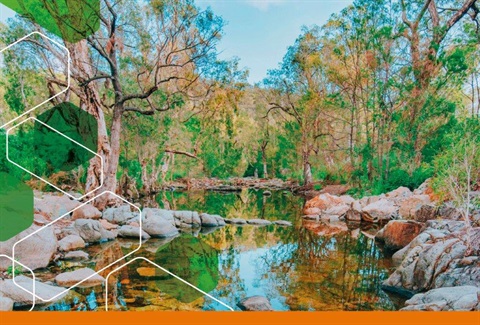Caring for our catchment

Did you know? The Rockhampton Region is home to the mighty Fitzroy River which is the largest river flowing to the Great Barrier Reef.
Much like the veins, arteries and heart of our body, the interconnected network of creeks, rivers and oceans are the lifeblood of our environment. In the same way that it is important to ensure our body remains healthy and functioning correctly, keeping our waterways healthy is also vitally important.
Our homes are literally directly connected (by pipes) to our natural waterways. What you do around your home, in your garden and street can have consequences downstream. Whether it's what flows down your sink or into your stormwater drains, it all ends up back in our water catchment at some point.
An important part of looking after our natural waterways is minimising any negative flow on effects from your home.
Why not make a few simple switches in your household to help keep our waterways healthy. Below are just a sample of top tips to get you started!
Keep your soil from running off
Keep your nutrient rich top soil working hard in your yard instead of running off and entering stormwater drains and waterways.
- If you are doing a backyard blitz, keep any soil deliveries covered until spread out.
- Reconsider or limit hard surfaces in your yard and maximise green areas to absorb more water.
- Mulch garden beds to lessen soil run off in heavy rain.
Give harsh chemicals the boot
Choose household and garden products that are better for you and the environment.
- Research alternative products for harsh chemicals. Check fertilisers and garden chemicals carefully and choose less harmful products.
- Wash your car on grass if possible, taking care to keep soap and suds out of the stormwater drain.
- Store and dispose of hazardous chemicals correctly.
Pick it up buttercup
Keep our local waterways clean by correctly disposing of weeds, litter and animal manure.
- Correctly dispose of weeds, grass and garden clippings, either by composting or using your general waste bin.
- Pick up animal manure, contain it and place it in general waste bins.
- Safely pick up litter to prevent it being swept into stormwater drains.
- If you witness littering or illegal dumping taking place, report it.
Watch what washes down the sink
What is washed down household sinks and toilets is thoroughly treated at Sewage Treatment Plants but we can all help to improve what goes down our household plumbing pipes.
- Research household products like shower washes and cleaning products to find more natural alternatives and products that don't contain microbeads.
- Don't spoil it at the toilet - only the three 'p's' down the loo, that's pee, paper and poo.
- Think at the sink - use a sink strainer to capture food and don't put oils and fats down the drain.
There are so many more helpful resources available to assist you to learn more about caring for our local catchment. Check out some of them below.